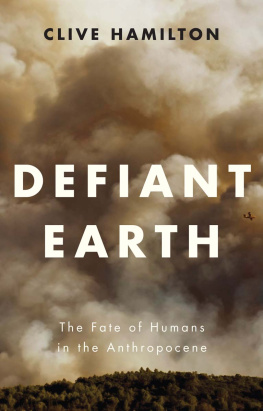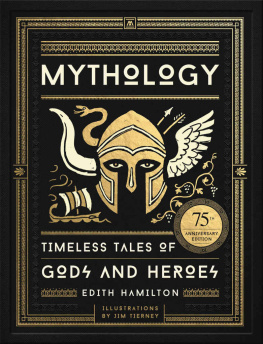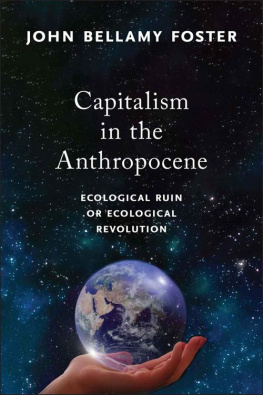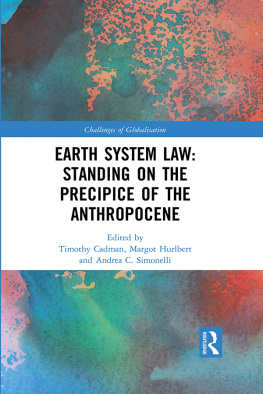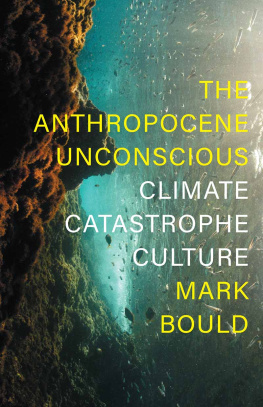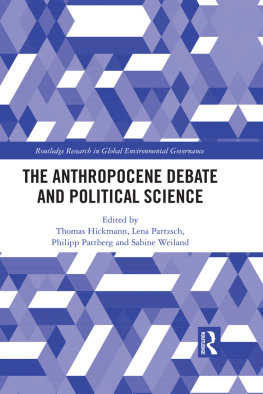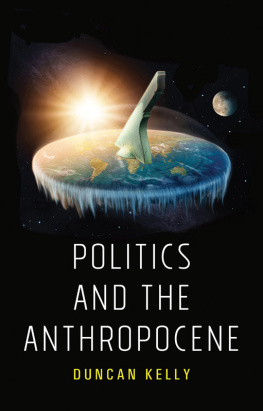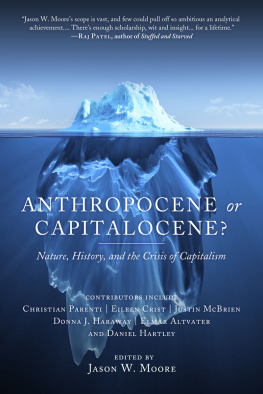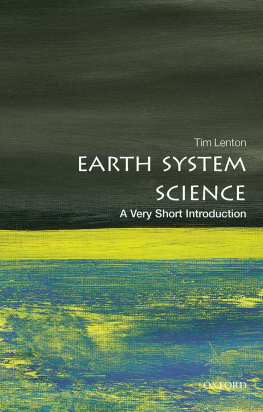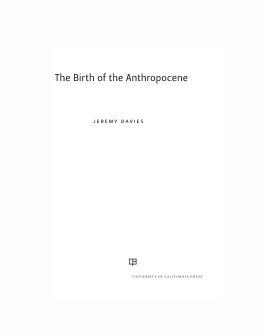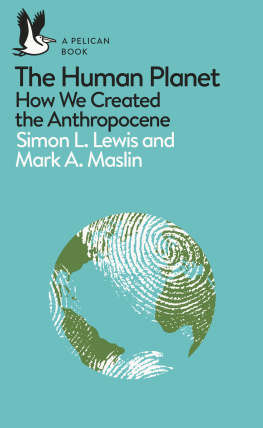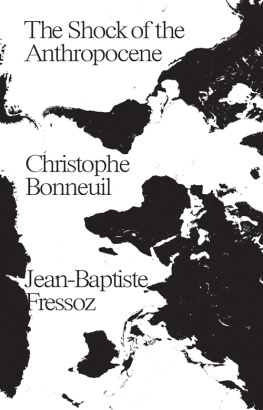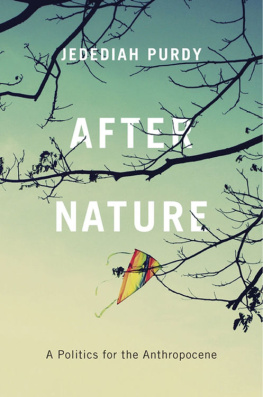Contents
Guide
Pages

Defiant Earth
The Fate of Humans in the Anthropocene
Clive Hamilton
polity
Copyright Clive Hamilton 2017
The right of Clive Hamilton to be identified as Author of this Work has been asserted in accordance with the UK Copyright, Designs and Patents Act 1988.
First published in 2017 by Polity Press
Polity Press
65 Bridge Street
Cambridge CB2 1UR, UK
Polity Press
350 Main Street
Malden, MA 02148, USA
All rights reserved. Except for the quotation of short passages for the purpose of criticism and review, no part of this publication may be reproduced, stored in a retrieval system or transmitted, in any form or by any means, electronic, mechanical, photocopying, recording or otherwise, without the prior permission of the publisher.
ISBN-13: 978-1-5095-1978-1
A catalogue record for this book is available from the British Library.
The publisher has used its best endeavours to ensure that the URLs for external websites referred to in this book are correct and active at the time of going to press. However, the publisher has no responsibility for the websites and can make no guarantee that a site will remain live or that the content is or will remain appropriate.
Every effort has been made to trace all copyright holders, but if any have been inadvertently overlooked the publisher will be pleased to include any necessary credits in any subsequent reprint or edition.
For further information on Polity, visit our website: politybooks.com
Preface: On Waking Up
This is not a book of warning; it is a book groping toward an understanding of what it means after 200,000 years of modern humans on a 4.5 billion-year-old Earth to have arrived at this point in history, the Anthropocene. I say groping toward because the change has come upon us with disorienting speed. It is the kind of shift that typically takes two or three or four generations to sink in. Our best scientists tell us insistently that a calamity is unfolding, that the life-support systems of the Earth are being damaged in ways that threaten our survival. Yet in the face of these facts we carry on as usual. Most citizens ignore or downplay the warnings; many of our intellectuals indulge in wishful thinking; and some influential voices declare that nothing at all is happening, that the scientists are deceiving us. Yet the evidence tells us that so powerful have humans become that we have entered a new and dangerous geological epoch, defined by the fact that the human imprint on the global environment has now become so large and active that it rivals some of the great forces of Nature in its impact on the functioning of the Earth system.
This bizarre situation, in which we have become potent enough to change the course of the Earth yet seem unable to regulate ourselves, contradicts every modern belief about the kind of creature the human being is. So for some it is absurd to suggest that humankind could break out of the boundaries of history and inscribe itself as a geological force in deep time. Humans are too puny to change the climate, they insist, so it is outlandish to suggest we could change the Geological Time Scale. Others assign the Earth and its evolution to the divine realm so that it is not merely impertinence to suggest that humans can overrule the Almighty but blasphemy. Many intellectuals in the social sciences and humanities do not concede that Earth scientists have anything to say that could impinge on their understanding of the world, because the world consists only of humans engaging with humans, with nature no more than a passive backdrop to draw on as we please. The humans-only orientation of the social sciences and humanities is reinforced in mediatized societies where total absorption in representations of reality derived from various forms of media encourages us to view the ecological crisis as a spectacle that takes place outside the bubble of our existence.
It is true that grasping the scale of what is happening requires not only breaking the bubble but also making the cognitive leap to Earth System thinking. It is one thing to accept that human influence has spread across the landscape, the oceans, and the atmosphere, but quite another to make the jump to understanding that human activities are disrupting the functioning of the Earth as a complex, dynamic, ever-evolving totality comprised of myriad interlocking processes. But consider this astounding fact.
With knowledge of the cycles that govern Earths rotation, including its tilt and wobble, paleo-climatologists are able to predict with reasonable certainty that the next ice age is due in 50,000 years time. Yet because carbon dioxide persists in the atmosphere for millennia, global warming from human activity in the twentieth and twenty-first centuries is expected to suppress that ice age and quite possibly the following one, expected (other things being equal) in 130,000 years. If human activity occurring over a century or two can irreversibly transform the global climate for tens of thousands of years, we are prompted to rethink history and social analysis as a purely intra-human affair.
How should we understand the disquieting fact that a mass of scientific evidence about the Anthropocene, an unfolding event of colossal proportions, has been insufficient to induce a reasoned and fitting response? For many, the accumulation of facts about ecological disruption seems to have a narcotizing effect, all too apparent in popular attitudes to the crisis of the Earth System, and especially among opinion-makers and political leaders. A few have opened themselves to the full meaning of the Anthropocene, crossing a threshold by way of a gradual but ever-more disturbing process of evidence-assimilation or, in some cases, after a realization that breaks over them suddenly and with great force in response to an event or piece of information in itself quite small.
In German, Erlebnis can simply mean an event or occurrence in the course of life, the type of personal experience that was the hallmark of nineteenth-century Romanticisms appeal to feeling. But it can also refer to an intense disruptive episode, one that makes an indelible impression, changing a life course, the kind of experience not so much integrated into a life but which relegates the old life to the past and inaugurates a new sensibility, something unforgettable and irreplaceable, something whose meaning cannot be exhausted by conceptual determination. conscious that we face a struggle between ruin and the possibility of some kind of salvation.
So today the greatest tragedy is the absence of a sense of the tragedy. The indifference of most to the Earth Systems disturbance may be attributed to a failure of reason or psychological weaknesses; but these seem inadequate to explain why we find ourselves on the edge of the abyss. How can we understand the miserable failure of contemporary thinking to come to grips with what now confronts us? A few years after the second atomic bomb was dropped, Kazuo Ishiguro wrote a novel about the people of Nagasaki, a novel in which the bomb is never mentioned yet whose shadow falls over everyone. The Anthropocenes shadow too falls over all of us. Yet the bookshops are regularly replenished with tomes about world futures from our leading intellectuals of left and right in which the ecological crisis is barely mentioned. They write about the rise of China, clashing civilizations, and machines that take over the world, composed and put forward as if climate scientists do not exist. They prognosticate about a future from which the dominant facts have been expunged, futurologists trapped in an obsolete past. It is the great silence. At a dinner party one of Europes most eminent psychoanalysts held forth ardently on every topic but fell mute when climate change was raised. He had nothing to say. For most of the intelligentsia, it is as if the projections of Earth scientists are so preposterous they can safely be ignored. Perhaps the intellectual surrender is so complete because the forces we hoped would make the world a more civilized place personal freedoms, democracy, material advance, technological power are in truth paving the way to its destruction. The powers we most trusted have betrayed us; that which we believed would save us now threatens to devour us. For some, the tension is resolved by rejecting the evidence, which is to say, by discarding the Enlightenment. For others, the response is to denigrate calls to heed the danger as a loss of faith in humanity, as if anguish for the Earth were a romantic illusion or superstitious regression. Yet the Earth scientists continue to haunt us, following us around like wailing apparitions while we hurry on with our lives, turning round occasionally with irritation to hold up the crucifix of Progress.

